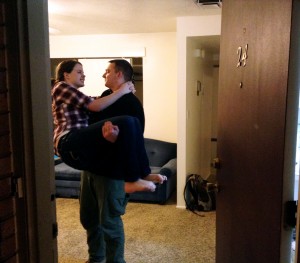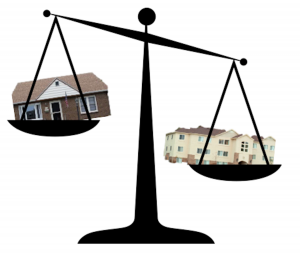Engaged couples and newlyweds may feel they have met their match when searching for housing near BYU campus that suits both budget and taste.
“The main reason that we chose (our apartment complex) was it was the nicest place within our price range that was actually offered to us,” said Emily Fine, a senior from California who lives in Wymount Terrace. “So many other places that we looked at rejected our application or chose other tenants who were willing to pay more or move in sooner.”
Provo and Orem offer three options for married BYU students: apartments, BYU-operated housing or small houses. The typical price for a single-bedroom apartment for a married couple can range anywhere from $600 to $900 per month. Houses that are shared with at least four other couples range upward of $650, depending on the location and condition of the property.
Wymount Terrace, the only BYU-operated married housing option, starts at $620.
“I like that all my rent and other charges just show up on my financial account from BYU,” said Aubrey Brennan, a junior living at Wymount. “I know exactly what they are charging me, and it’s nice to not have to deal with checks and housing offices.”
Prospective renters must watch for the price of utilities, parking, upkeep and other “hidden” expenses. Pricing for non-BYU housing is also competitive and rent managers often adjust prices for bidding opportunities among couples.
Most housing employers cut $200 from rent for tenants who work as community aids or on-site managers. Duties include assisting new move-ins, keeping track of keys, filing damages and repairs, representing the complex and planning community events.

Students can also save money the farther they go from BYU campus, but they have to consider the other costs as they leave the “safe zone” of predominantly married student wards.
“We didn’t want to live in any houses too far from campus,” said Zac Wagner, a junior from California. “Married wards seemed kind of awkward for us so we chose a house that was in walking distance from the south stairs.”
Expense and travel time can also be a factor that keeps students’ home base near campus, but some risk the distance.
“I live in a four-plex in south Provo, and I love it,” said Eric Sackett, a junior from Orem. “I have to drive to school every day, but it’s worth it because our cul-de-sac is a group of newly married people that we are friends with.”
The real cost of housing can be complicated by space and amenities, as couples may not know what comes standard and what is a real find. Most shared spaces range from 430 to 750 square feet, although houses split among couples by floor are often more generous with space and amenities like laundry, electrical outlets and lighting, parking and dishwashers.
Noise is one factor that varies with every housing option. Renters from Wymount complain that the newer buildings with dry-wall let in more noise compared with the older buildings, which are made of cinder block.
“Our neighbors are rarely loud, but when they are, it’s very noticeable,” Fine said of her Wymount apartment. “It makes you wonder what they can hear in our apartment.”
Noise, price and location are challenges in married students’ search for their match. They can find information on all these factors at http://och.byu.edu/ or the BYU Housing Guide.





